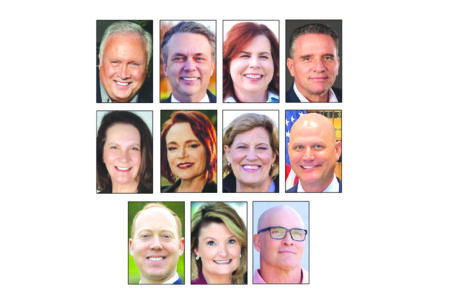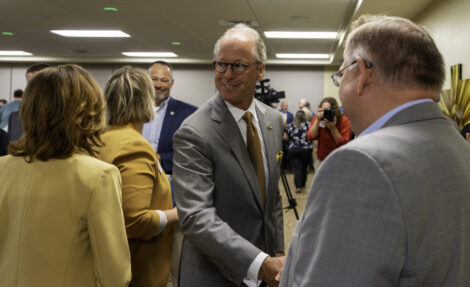KU employees must remove ‘he, she, they, them’ pronouns from email signature lines as part of state directive

photo by: Chad Lawhorn/Journal-World
University of Kansas Chancellor Douglas Girod speaks at the FBI and KU Cybersecurity Conference on April 4, 2025.
UPDATED 6:05 P.M. JULY 22
University of Kansas employees with official KU email accounts soon will be prohibited from listing their preferred pronouns — he/she and they/them, for example — as part of their email signature lines.
KU Chancellor Douglas Girod sent an email to KU faculty and staff members Tuesday notifying them that signature lines that communicate which pronouns the sender prefers were deemed to be out of compliance with a provision approved by the Kansas Legislature during its last session. KU employees — including student employees — must remove all such pronouns and other “gender ideology” from their KU work accounts by the end of this month.
“All employees shall comply with this directive by removing gender-identifying pronouns and personal pronoun series from their KU email signature blocks, webpages and Zoom/Teams screen IDs, and any other form of university communications,” Girod said in his email message to employees.
Girod said the Kansas Board of Regents, the entity that oversees KU and the state’s other public universities, recently made the determination that such gender pronouns are out of compliance with the direction of the Kansas Legislature, which included the requirement in a budget bill that provides funding for the universities.
A majority of members in the Republican-controlled Kansas Legislature expressed various concerns about diversity, equity and inclusion policies on university campuses, and the budget proviso grew from those concerns.
To not comply with the pronoun provision of the budget bill could put significant amounts of KU’s state funding at risk.
However, it is unclear whether Girod and the other CEOs of the state’s public universities were technically directed by the Regents to make the change or whether each university leader has the discretion to set the policy for their universities and risk the budget consequences.
What is clear is that the actual Board of Regents — the nine-member board appointed by the governor — has never voted on the pronoun issue or taken any other action on the state’s legislative proviso that was approved in April as part of the state’s overall budget bill.
Instead, a spokesman for the Regents told the Journal-World that the general counsel in the Regents office sent a memo last month to leaders at the state universities providing “guidance” on how to comply with the budget proviso.
The Journal-World asked for and received a copy of that June 18 communication to the state’s universities. The unsigned memo is titled “Kansas Board of Regents Diversity Equity and Inclusion Guidance for State Universities in Kansas.” The first paragraph of the document also states the information is “guidance to assist universities as they seek to comply with state law.”
That language indicates each university may have some discretion in whether to implement the change in pronoun policy. But the last section of the memo uses different language and says universities are “directed to” make five changes, which include the new pronoun rules.
The Journal-World has asked for clarification from the Regents spokesman on whether the Regents — who under state law are the final authority over the state’s public university system — have mandated that universities implement the pronoun change or whether each university has the discretion to act as it sees fit.
A Regents spokesman hasn’t yet responded, but a spokesman for KU said the chancellor’s office viewed the June 18 communication as “a directive from the Kansas Board of Regents and not at the discretion of university CEOs.”
Any university that chose not to implement the pronoun policy, however, presumably would be taking a big risk of losing state funding. A seven-paragraph section of the nearly 300-page state budget bill explicitly directs the secretary of administration to certify that all state agencies have “removed gender identifying pronouns or gender ideology from email signature blocks on state employee’s email accounts and any other form of communication.”
The same proviso also directs all state agencies to: eliminate all positions related to diversity, equity and inclusion; eliminate any policies related to diversity, equity and inclusion; eliminate training requirements related to DEI; and cancel any state grants or contracts related to DEI.
In his Tuesday email, Girod said KU was in compliance with those four provisions, but needed to make changes to become in compliance with the pronoun provision.
The budget section in question doesn’t specifically state what will happen to any state university or agency that is found out of compliance. Rather, it directs the secretary of administration to check for compliance as of Aug. 1, and to report findings to the State Finance Council.
But given that the proviso is directly linked to the bill that appropriates state funds, the risks of not complying with the provisions include the possible loss of state funding. For KU, a loss of state funding would have a huge impact on its overall budget. Nearly 15% of KU’s $1.1 billion operating budget for the Lawrence campus — or about $155 million — came from the state in the 2024 fiscal year, according to KU documents.
Whether the new policy will create potential legal liabilities for KU and other state agencies, however, is also a possibility. The use of pronouns has become a First Amendment issue in several instances, although government actions prohibiting employees from using their preferred pronouns are new enough phenomena that case law is limited.
FIRE — the Foundation for Individual Rights and Expression — has argued that when universities dictate pronoun use, they are engaging in a form of compelled speech, which is illegal under the First Amendment. The organization has most often addressed the subject in the context of universities that have tried to require faculty to use the preferred pronouns of students. FIRE has argued the First Amendment doesn’t allow that type of compelled speech. Its reasoning, though, may apply to the inverse argument that universities can prohibit employees from using certain pronouns.
“Any policy compelling the use of certain pronouns intrudes on the right to private conscience and, when it comes from the government, violates the First Amendment,” a FIRE webpage on the subject states.
However, the U.S. Supreme Court has ruled employees acting in their official capacity have far fewer First Amendment protections than they do as private citizens. Whether courts would view the signature line of a work email as business or individual speech is unclear.
The Journal-World asked both the Regents and KU spokesmen whether the pronoun policy created First Amendment concerns. The Regents spokesman did not respond by the Journal-World’s deadline, and the KU spokesman referred the question to the Regents office.
Girod’s Tuesday email to KU employees — which also was signed by Provost Barbara Bichelmeyer and KU Medical Center Executive Vice Chancellor Steve Stites — made no mention of First Amendment issues. The email also made no effort to justify the policy change, other than to say the university was following a Regents directive.
The KU leaders did, however, remind employees that there are counseling services available if the new policy causes distress.
“Each Jayhawk contributes to the community of learning and growth that is KU,” they wrote. “Our community is founded on the respect and support we each provide to others. If you know of a student, staff, or faculty member who needs assistance as a result of this new requirement, please consider submitting a Support and Care referral.”
The announcement came during a time period when the KU campus is largely devoid of students and classes. Some KU employees reached out to the Journal-World Tuesday afternoon expressing surprise and concern about the new policy, while others said they expected it would produce more discussion once the fall semester begins next month.
Misty Heggeness, an associate professor and Faculty Senate president, said the group had not discussed the new policy, as the Faculty Senate does not meet during the summer semester.
“It is likely this will be on the agenda for our first faculty senate meeting in the fall, with a focus on how we can make sure all faculty, students, and staff are able to engage with the University community and have a sense of feeling welcomed within our community,” Heggeness told the Journal-World via email.







